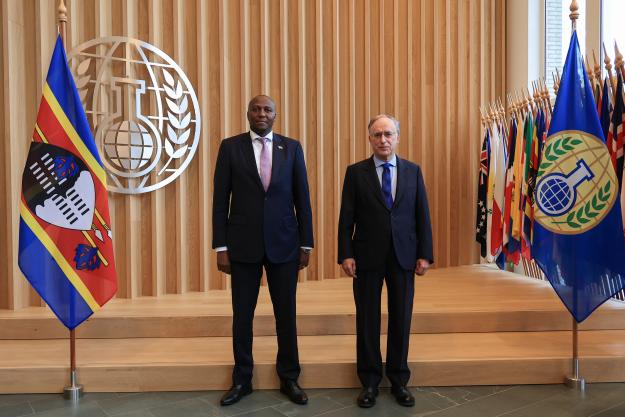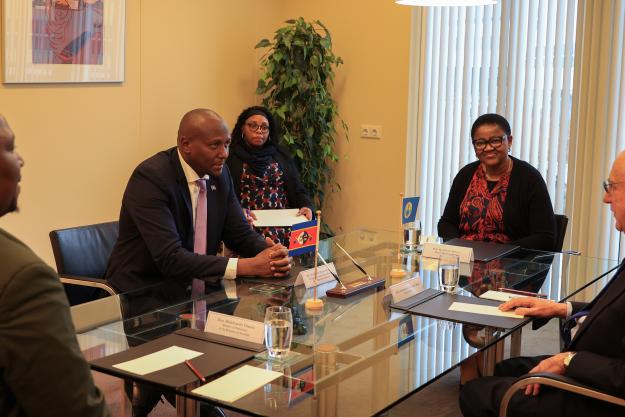THE HAGUE, Netherlands-25 February Year-The Director-General of the Organisation for the Prohibition of Chemical Weapons (OPCW), Ambassador Fernando Arias, met with the Prime Minister of the Kingdom of Eswatini, H.E. the Right Honourable Russel Mmiso Dlamini, on 20 February 2025 at the OPCW's Headquarters in The Hague.
During the meeting, the two parties discussed challenges and opportunities for strengthening the global norm against chemical weapons amid an evolving international security climate. Director-General Arias briefed Prime Minister Dlamini on his recent meeting with Syria's interim President Ahmad al-Sharaa and Foreign Minister Asaad Hassan al-Shaibani in Damascus. He re-affirmed the Technical Secretariat's commitment to support Syria in achieving its long-term compliance with the Chemical Weapons Convention (CWC) and its readiness to complete the elimination of Syria's chemical weapons programme after eleven years of obstruction by the former Syrian authorities.
Director-General Arias also gave an overview of a recently published report on the OPCW's second Technical Assistance Visit to Ukraine . The report confirmed the presence of Chlorobenzylidenemalononitrile (CS), a riot control agent, along the confrontation lines in the Dnipropetrovsk region. Under the CWC, using such agents as a method of warfare is prohibited. This is the second report released by the Technical Secretariat upon request by Ukraine, confirming the presence of CS in this area, following the release of the first report in November 2024.

H.E. The Right Honourable Russell Mmiso Dlamini, Prime Minister of the Kingdom of Eswatini, and Ambassador Fernando Arias, OPCW Director-General, during a visit to OPCW Headquarters in The Hague, the Netherlands, on 20 February 2025.
Director-General Arias underlined the importance of closely monitoring advancements in science and emerging technologies, especially in the context of rising concerns about AI being misused by non-state actors. He noted, however, that emerging technologies could also present opportunities to advance the implementation of the Convention and underlined that the OPCW Centre for Chemistry and Technology (ChemTech Centre) significantly enhances the Organisation's capabilities to keep abreast of developments in this field.
Director-General Arias concluded by highlighting the importance of the OPCW Africa Programme , which provides tailored capacity-building activities in chemical safety and security across Africa.
"The Kingdom of Eswatini, as a State Party, remains fully committed to the principles of the Chemical Weapons Convention. We commend the OPCW's ongoing efforts towards the complete destruction and elimination of chemical weapons globally and the quest to ensure that chemistry is used exclusively for peaceful purposes," Prime Minister Dlamini said.
"Our engagement with the OPCW, particularly in capacity-building initiatives, reinforces our dedication to international cooperation and the protection of human lives. We look forward to deepening our collaboration to support a safer world free of chemical weapons for all," he added.

Left to right: Honourable Bhekibandla Vilakati, Member of Parliament, H.E. The Right Honourable Russell Mmiso Dlamini, Prime Minister of the Kingdom of Eswatini, Ms Xolile Ngwenya, Counsellor, Embassy of Eswatini, Ambassador Odette Melono, OPCW Deputy Director-General, and Ambassador Fernando Arias, OPCW Director-General, meet during a visit to OPCW Headquarters in The Hague, the Netherlands, on 20 February 2025.
Director-General Arias stated: "I thank the Kingdom of Eswatini for its steadfast commitment and support to enhancing OPCW's activities. The Technical Secretariat continues to work with all Member States to uphold the global norm against chemical weapons. Through collaboration and adherence to the Chemical Weapons Convention, we can ensure a safer, more secure world free of chemical weapons for future generations."
Background
The Kingdom of Eswatini has been an active member of the OPCW since the Chemical Weapons Convention entered into force in 1997.
As the implementing body for the Chemical Weapons Convention, the OPCW, with its 193 Member States, oversees the global endeavour to permanently eliminate chemical weapons. Since the Convention's entry into force in 1997, it is the most successful disarmament treaty eliminating an entire class of weapons of mass destruction.
In 2023, the OPCW verified that all chemical weapons stockpiles declared by the 193 States Parties to the Chemical Weapons Convention since 1997 - totalling 72,304 metric tonnes of chemical agents - have been irreversibly destroyed under the OPCW's strict verification regime.
For its extensive efforts in eliminating chemical weapons, the OPCW received the 2013 Nobel Peace Prize.






